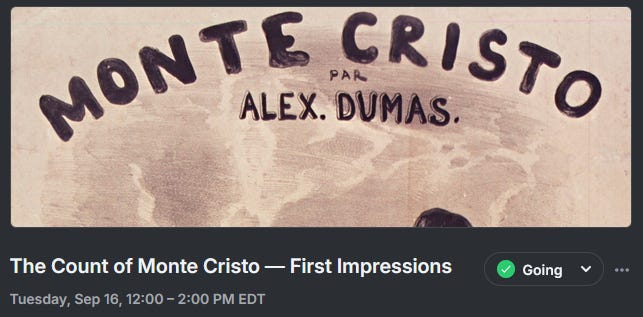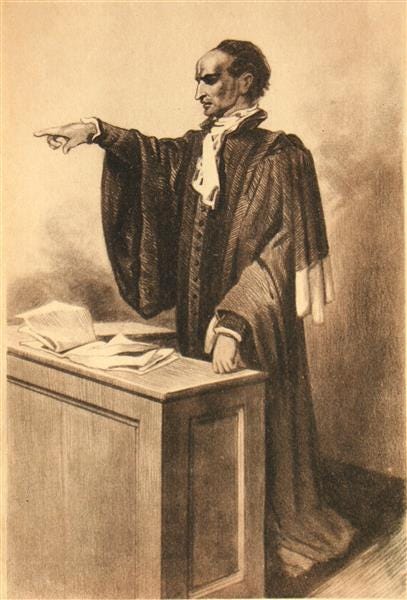Monte Cristo’s True Villain
How reason itself became corrupted by evil
The Count of Monte Cristo shines as an infamous revenge tale, yet its true genius lies not in its vengeance, rather it’s in the evil that makes the revenge necessary in the first place.
The story’s conspirators are not merely petty criminals looking for worldly gain, rather they’re motivated by treacheries that take roots in the depths of the human soul itself. In fact, one conspirator is so depraved that Dante the poet would have consigned him to the lowest circle of Hell itself.
Yet understanding his evil helps you understand and deepen your love for justice like few villains ever will.
Here then, are the evils behind Monte Cristo’s conspirators, the vilest of the criminals, and what his character teaches you about evil, justice, and human nature.
Don’t forget to join our FREE book club!
We started a digital book club to study the great texts of Western Civilization — from Dante to Dostoevsky — together. Inside, you’ll get:
Live community book discussions (bi-weekly)
New, deep-dive literature essays every week
The entire archive of book reviews + our 100 great texts reading list
Our first discussion on The Count of Monte Cristo takes place today at 12pm ET!
Sign up below to attend — all paid members can join the live discussion up on stage…
Note: paid subscribers via Substack will automatically receive an access link for the live calls.
An Unholy Trio
Edmond Dantes is the protagonist of the story, and the victim of this conspiracy. He is a 19-year-old sailor, recently promoted to captain and engaged to a beautiful woman named Mercedes.
It’s his good fortune that sparks the conspiracy, led by an unholy trio — Fernand, Danglars, and Villefort.
Fernand and Danglars begin the conspiracy. They write an anonymous letter accusing Dantes of political treason. Their motivations are simple — Fernand wants Dantes’ fiance, Danglars his job. One man is motivated by wrath, the other greed, but both united in envy.
What becomes of their letter?
It falls into the hands of deputy prosecutor Villefort.
Villefort sees through this letter and discerns Dantes’ innocence. However, the letter also implies Dantes is working with a man named Noirtier — who’s Villefort’s father. In other words, Villefort knows Dantes is innocent, but fears letting the man walk free could harm his career and reputation.
He knowingly condemns the innocent young man to life in prison.
At this point, the conspiracy is clear — each villain was motivated by a simple gain of wealth, power, or love.
Yet of these three criminals, one’s treachery is far worse than the others, and leads to untold evils throughout the duration of the novel.
The True Conspirator
Of the three conspirators, Villefort is by far the most evil.
This may seem contradictory — Fernand wished to murder Dantes outright, and Danglars was the one who initiated the conspiracy.
Also notable, Villefort is the only one who experiences sadness and remorse over his actions. The other two either forget Dantès or celebrate his ruin.
So why is Villefort the cruelest?
He is the most evil because his crime betrays the greatest good of his own soul.
Fernand is murderous but ruled by passion. He is not a clear thinker; his evil stems from wrath, not a deliberate intent to harm.
Danglars is worse — his envy and betrayal are more personal and conscious, yet Dumas goes on to Danglars in almost subhuman tones, even calling him a, “demon of hatred.”
The point is, both of these characters are repulsive, but their very vileness shows a subhuman element to their evils — they’re irrational and “know not what they do.”
Villefort, however, is a criminal of sheer rationality. His deceit is a personal betrayal devoid of passion — a blend of hypocrisy, institutional corruption, and perversion of reason. To invoke the poet Dante again — a man who both betrayed his office and betrayed personal friends would be sent into the deepest circle of the Inferno, perhaps into Satan’s jaws himself.
This is because impassioned crimes of the intellect — like Villefort’s — betray reason itself. Pragmatically, Villefort has betrayed bond of personal kin, and bond of his office, meaning all of France will suffer systemically at his corrupt ways.
Personally, however, he’s also corrupted his reason, which is the greatest part of the soul. Infamously, the vilest characters are those whose evil stems from their greatest good.
Yet as of now, these claims of Villefort’s evil remain abstract.
You don’t see the real horror of his evil until you see the corruption of Dantes himself. The once kind and innocent young man will be grossly infected by that conspiracy. What results is the birth of a new sort of “demon,” — a man whose quest for vengeance has haunted the minds of man for 200 years and counting…






